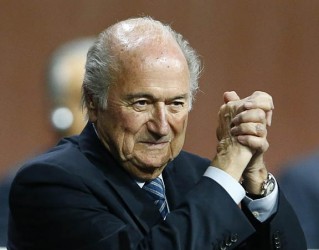ZURICH, (Reuters) – Sepp Blatter is set to face the media in Zurich on July 20 for the first time since he announced last month that he would step down as president of soccer’s governing body FIFA.

Blatter and secretary general Jerome Valcke will both take part in a news conference after an executive committee meeting which will set the date for the extraordinary FIFA Congress and presidential election, FIFA said yesterday.
The meeting at FIFA headquarters will also discuss possible structural reforms to FIFA, according to the agenda which was published on the soccer body’s website.
These proposals, which are likely to include changes in the way the executive committee is elected, would then be put to the FIFA Congress.
Blatter, 79, was elected for a fifth term as FIFA president on May 29 but announced four days later that he would lay down his mandate at the extraordinary Congress and call a fresh election where he would not be a candidate.
The announcement came with FIFA in turmoil after 14 sports marketing executives and soccer officials, including several from FIFA, were indicted in the United States in late May on bribery, money laundering and wire fraud charges involving more than $150 million in payments.
Seven of those accused were arrested by Swiss police in a dawn raid on a luxury Zurich hotel two days before the FIFA Congress where Blatter was re-elected.
Since then, Blatter has given a handful of exclusive interviews to German-speaking media but has not spoken in public. He did not take questions after the speech in which he announced his decision to step down.
Blatter did not travel to Canada to present the trophy at the Women’s World Cup final on July 5, a duty which instead fell to FIFA vice-president Issa Hayatou.
He also missed the Copa America, a tournament he has routinely attended in the past, in Chile.
On July 5 he told the German newspaper Welt am Sonntag that he would not take any “travel risks” until everything had been cleared up.
U.S. prosecutors have not accused Blatter of any wrongdoing, but his stewardship of soccer’s governing body is under scrutiny, sources familiar with investigations in the United States and Switzerland have said.
Blatter has said he will use his final months as president to try and push through reforms.
He has proposed that the executive committee should be elected directly by the FIFA Congress, where FIFA’s 209 national associations each hold one vote, rather than the current system where the continental confederations choose their representatives.
He also wants all executive committee members to be subject to independent integrity checks by FIFA’s ethics committee.





